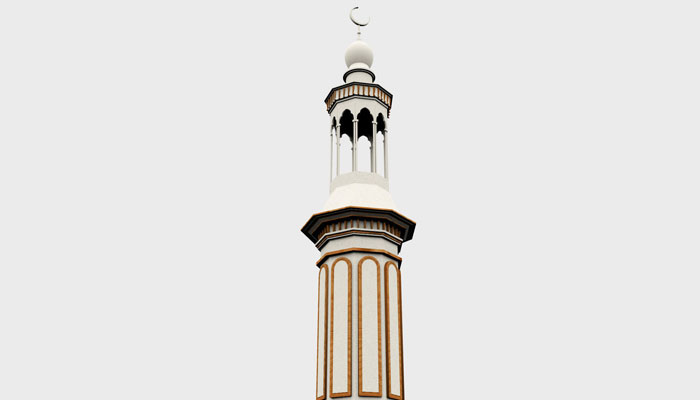Mosques, madrasas facing financial crisis under lockdown
Maulana Hamid Sharif, a religious teacher, manages a madrasa and a mosque adjacent to it in the Orangi Town locality. In the Islamic months of Shaban and Ramazan, Sharif and his team would make the annual budget and raise their annual revenue through donations from two factory owners and mosque-goers.
But this year, amid the coronavirus outbreak, their donors have already given zakat to a known charity in Karachi to support its free ration distribution campaign. Also, because of the closure of the factories for around two months, they are not able to give donations to Sharif to run his madrasa and mosque this year.
“Mosques and madrasas mainly depend on the donations collected during Shaban and Ramazan to pay salaries to the prayer leaders, the teachers and other staffers along with clearing the utility bills and providing free food and accommodation to the seminary students,” said Sharif.
In the government’s policymaking and debate about the closure of mosques in Ramazan, the major concern of the clerics is the collection of donations which is forcing them to resist the government's moves to ban religious congregations, analysts believe.
Unlike the rest of the Muslim world, mosques and madrasas operate independently in Pakistan and do not come under the government’s direct control. Therefore, the government does not provide them with any financial support to operate.
Because of the coronavirus pandemic and the lockdown imposed by the government to limit its spread, donations have majorly shifted from religious seminaries and mosques to the charity and welfare organisations. In the meeting of religious scholars with President Arif Alvi on April 18 for inking a 20-point agreement for Ramazan, the participants expressed their concerns over a sharp fall in donations to the madrasas and mosques, according to religious scholars privy to the meeting.
While announcing the agreement as he addressed the media, President Alvi especially requested the people not to reduce their donations to these Islamic institutions in Ramazan. He said the donations, including alms and zakat, were the right of mosques and seminaries.
Interviews with managers of various seminaries suggest that most madrasas wait the entire year for Shaban and Ramazan for donation.
“Many mosques and madrasas do not pay salaries for four months before Ramazan in which they pay them in a lump sum after the collection of donations,” said Sharif. He said the madrasa administrators would be forced to slash the salaries of their staff by half or terminate their services. Mostly, he added, the staff is already underpaid.
Mufti Muhammad Naeem, principal of the Jamia Binoria Al-Alamia, also confirmed that donors had shifted their donations to the charities which were running ration distribution campaigns because of the coronavirus pandemic. “Because of it, the madrasas and mosques have been facing a financial crisis,” Naeem told The News.
Giving an example of his seminary where around 5,000 students study, Naeem said it would be difficult for the madrasas to continue their operations. “The government does not provide financial support to the mosques and seminaries and they completely depend on donations,” he said. Naeem requested the people to donate to the seminaries which had suffered badly because of the lockdown.
Almost all mosques and madrasas have been trying to figure out its next steps and, resultantly, some of them have set up charity fronts. “Because donors are interested to donate the money to the charities running the ration distribution among the needy people, many madrassas have set up their charity fronts over the night to collect the donations,” said a religious scholar, who is familiar with the affairs of madrassas.
-
 Sterling K. Brown's Wife Reveals If She Gets 'Paradise' Spoilers
Sterling K. Brown's Wife Reveals If She Gets 'Paradise' Spoilers -
 Rape Suspect Flees Aboard After Mistaken Prison Release
Rape Suspect Flees Aboard After Mistaken Prison Release -
 Jack Hughes' Patriotic Words Spark Calls For Tate McRae To Dump Her Boyfriend
Jack Hughes' Patriotic Words Spark Calls For Tate McRae To Dump Her Boyfriend -
 Andrew Pushes For Major Deal With King Charles To Avoid Jail
Andrew Pushes For Major Deal With King Charles To Avoid Jail -
 50 Cent Online Trolling Tactic Exposed As He Targets Rival Rappers' Mothers In Rap Beefs
50 Cent Online Trolling Tactic Exposed As He Targets Rival Rappers' Mothers In Rap Beefs -
 King Charles Attends 'series Of Meetings' Amid Growing Calls For His Abdication
King Charles Attends 'series Of Meetings' Amid Growing Calls For His Abdication -
 Prince William’s Visible Anxiety At Key Event Reveals Fears For King Charles’ Health
Prince William’s Visible Anxiety At Key Event Reveals Fears For King Charles’ Health -
 Channing Tatum Celebrates Hunter Theunis Botha's Death
Channing Tatum Celebrates Hunter Theunis Botha's Death -
 'Spider-Man: Brand New Day' Director Reveals What Fans Can Expect From The Movie
'Spider-Man: Brand New Day' Director Reveals What Fans Can Expect From The Movie -
 US Government To Cease Collecting Tariffs After Supreme Court Ruling
US Government To Cease Collecting Tariffs After Supreme Court Ruling -
 King Charles Finally Receives Good News About Reunion With Lilibet, Archie As Harry And Meghan Reach Agreement
King Charles Finally Receives Good News About Reunion With Lilibet, Archie As Harry And Meghan Reach Agreement -
 'House Of The Dragon' Season Three Promises Total Chaos As 'A Knight Of The Seven Kingdoms' Final Episode Drops
'House Of The Dragon' Season Three Promises Total Chaos As 'A Knight Of The Seven Kingdoms' Final Episode Drops -
 ‘Global Human Rights Are Under Attack,’ UN Chief Antonio Guterres Issues Stark Warning
‘Global Human Rights Are Under Attack,’ UN Chief Antonio Guterres Issues Stark Warning -
 Demi Lovato Bravely Admits She Is ‘not Ashamed’ Of Having Bipolar Disorder
Demi Lovato Bravely Admits She Is ‘not Ashamed’ Of Having Bipolar Disorder -
 Can Humans Reverse Aging? Harvard Scientist Predict Revolutionary Breakthrough
Can Humans Reverse Aging? Harvard Scientist Predict Revolutionary Breakthrough -
 How Liam Payne’s Death Impacted Awareness About Mental Health
How Liam Payne’s Death Impacted Awareness About Mental Health




